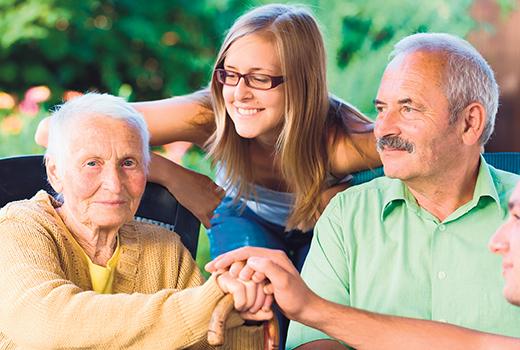My dad passed away a few years ago. Today, my mom, who has Alzheimer’s, lives in an assisted living home near us. Neither of my parents ever wanted to be a burden to anyone, but we wanted to provide the help they needed and to do our best to care for them personally at a time when they were unable to care for themselves.
One of my daughters recently shared with me that she would be “taking care of me someday.” My response was, “No. I will not be a burden to you.” Then I made some remark about getting on an ice float and floating away. While I was joking, there is usually some element of truth in our humor.
What makes us say we don’t want to be a burden to our children? Maybe it’s pride, suggests Russell Moore. “I want to live with the image in my loved ones’ memories of me as in my prime,” he wrote on his website, “Moore to the Point,” in May 2013. “I don’t want the humiliation of having to be cared for in my weakness, or the fearfulness of having to trust someone else to attend to my needs. I want to be a man, but I don’t want to be a helpless baby in need of parents or a helpless elder in need of my children.”
From conception to natural death, we need the help of others. It seems we start out being dependent on people, and we end our journey again dependent on people. Today, my mother does not remember much. I have spoken with her many times about her relationship with Christ, and every time, she talks about going to heaven because of Him. A few times I have asked her to sing a hymn with me. Recently, my wife surreptitiously videoed (with her phone) my mom and me singing “Amazing Grace” together. It was very light on talent, but it is a memory I will cherish. The next day, my mom didn’t remember it, but I did.
As Moore points out, “In the Body of Christ, there are not people who have burdens and people who don’t. We are to ‘bear one another’s burdens’ (Galatians 6:2). We are all a burden to be borne, just in different ways.” Choosing not to be a burden to anyone is noble thinking, perhaps, but knowing we are, or will be, a burden to some degree is a reality.
We celebrate the sanctity of human life this month because we are made in the image of God, but we live out the principle of the sacredness of life when we realize the need to care for others and to be cared for by others.
Life is precious and sacred. The older I get, the more loved ones I have in heaven. One day, I will see a brother and sister who died as infants. I will see the two babies we miscarried and our two grandchildren who were miscarried. Their lives began at conception. I will see loved ones who lived long lives before they died. The magnificence of seeing Jesus will put everything into a glorious perspective.
Charles Weigle was a Baptist evangelist and songwriter who was born in 1871 and died in 1966. He wrote more than 1,000 hymns and Christian songs. During his ministry, his wife left him and later died. He spent several years in such despondency that he contemplated suicide. He questioned if anyone really cared for him. Through time, God restored his faith and his ministry. One day, in less than 20 minutes, he wrote his most popular song, “No One Ever Cared for Me Like Jesus.” George Beverly Shea and many others have recorded it. The chorus says, “No one ever cared for me like Jesus, there’s no other friend so kind as He; No one else could take the sin and darkness from me, Oh how much He cared for me.”
God does care for His people. All human life is sacred, and His people need to protect the dignity of life. We need to care for people, and we need to be cared for by others. When we know God cares for us, we can give and receive care from others. From conception to the grave, it is about caring.

